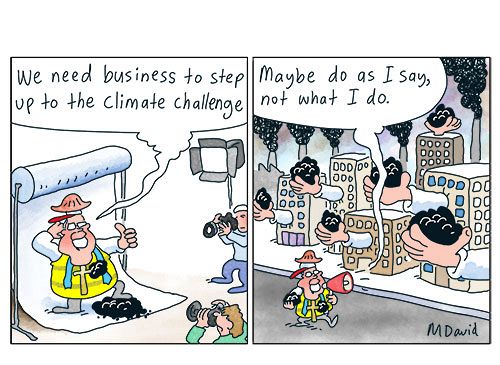Woodside Energy is facing protest votes by investors unhappy with the fossil fuel giant's emissions strategy, writes Will van de Pol.
AUSTRALIA’S LARGEST oil and gas company, Woodside, is under fire and the company’s chair, Richard Goyder, is in damage control ahead of crucial votes by investors at the annual general meeting (AGM) this week.
Mr Goyder is up for re-election and is clinging to his job after some of the world’s biggest investors and advisers have called for him to be dumped over the company’s failure to deliver a credible climate plan. The investors argue Woodside fails to outline a clear path for the company to align its business with global climate goals.
Woodside faces another world record non-binding vote against its climate plan after the company already suffered a revolt when 49% of shareholders voted against its 2022 version. Defenders of the multi-billion oil and gas industry are digging their heels in, backing Mr Goyder and Woodside’s lack of climate ambition to the hilt.
Amid all of this fire and fury, one key point is missing: Woodside is an outlier among fossil fuel companies. It has already faced a substantial protest vote against a director’s re-election in response to climate inaction, whereas directors of many other fossil fuel companies have faced no such repercussions.
Woodside director Ian Macfarlane was hit with 35% of investors voting against his re-election. But even that level of investor discontent has not been enough to drive material change in Woodside’s climate plan.
It is impossible to see how investors expect to drag fossil fuel companies into line – and live up to their own lofty climate and active ownership claims – without unseating directors who continue to preside over strategies that amount to gambling against global climate goals.
Recent Market Forces analysis found that an average of 95% of investors supported 1,700 directors in elections at 45 companies that are expanding the production of fossil fuels in Australia or overseas.
More than six years into the Climate Action 100+ investor initiative, overall there has been no drop-off in support for director elections at target companies that continue to fall well short of investors’ climate expectations. In fact, directors at companies failing to meet any of the CA100+ “board climate competency” criteria received higher support in 2023 than those that partially or fully met these criteria.
Most investors, including the world’s biggest asset firms such as JP Morgan, State Street and BlackRock, as well as Australia’s super funds, have been missing in action when it comes to holding fossil fuel company directors accountable, flying in the face of their climate commitments.
Climate change is accelerating and we’re hurtling towards the 1.5-degree warming limit set by the Paris Agreement. Meanwhile, the world’s biggest fossil fuel companies are trying to undermine this goal ratified by 195 countries and the European Union, which according to the International Energy Agency requires a 60% reduction in oil and gas emissions by 2030.
Woodside and others pursuing fossil fuel growth are pressing ahead with plans at odds with the science of global warming. Meanwhile, the world faces the skyrocketing human, environmental and economic costs of bushfires, floods and other climate change-fuelled disasters.
It is little wonder some of the world’s heftiest investment companies including KLP, Norway's biggest pension fund, and Britain’s $2.3 trillion asset manager, Legal General Investment Management (LGIM), have taken the unusual step of announcing they are voting against both Woodside’s climate plan and the re-election of Richard Goyder.
What is a wonder is that other investors, including the likes of AustralianSuper and health fund HESTA, are failing to do the same at Woodside and other companies undermining climate goals and exacerbating financial risks through new fossil fuel projects.
It all boils down to most investors claiming a lot and delivering little when it comes to driving genuine climate progress at fossil fuel companies they own. Non-binding votes and polite meetings over tea and biscuits are clearly not enough.
Six months ago, the corporate regulator, Australian Securities and Investment Commission (ASIC), warned Australia’s super funds not to overstate their active ownership efforts or they will face legal action.
It’s a ticking time bomb for funds, which are failing to hold the directors of companies like Woodside to account for inadequate and dangerous climate plans.
Will van de Pol is the CEO of Market Forces and is driven by his desire to play an active role in the fight for climate justice.
Related Articles
- Woodside and other polluters littering our oceans
- Fossil fuel company seeks to undo decades of whale conservation
 This work is licensed under a Creative Commons Attribution-NonCommercial-NoDerivs 3.0 Australia License
This work is licensed under a Creative Commons Attribution-NonCommercial-NoDerivs 3.0 Australia License
Support independent journalism Subscribe to IA.













